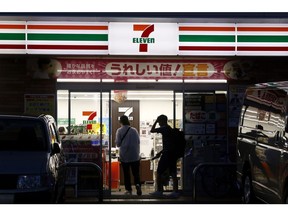
Article content
(Bloomberg) — Alimentation Couche-Tard Inc.’s decision to walk away in frustration from an attempted acquisition of Seven & i Holdings Co. set off a debate in Tokyo as to what lessons foreign companies with ambitions for M&A should draw.
THIS CONTENT IS RESERVED FOR SUBSCRIBERS ONLY
Subscribe now to read the latest news in your city and across Canada.
- Exclusive articles from Barbara Shecter, Joe O'Connor, Gabriel Friedman, and others.
- Daily content from Financial Times, the world's leading global business publication.
- Unlimited online access to read articles from Financial Post, National Post and 15 news sites across Canada with one account.
- National Post ePaper, an electronic replica of the print edition to view on any device, share and comment on.
- Daily puzzles, including the New York Times Crossword.
SUBSCRIBE TO UNLOCK MORE ARTICLES
Subscribe now to read the latest news in your city and across Canada.
- Exclusive articles from Barbara Shecter, Joe O'Connor, Gabriel Friedman and others.
- Daily content from Financial Times, the world's leading global business publication.
- Unlimited online access to read articles from Financial Post, National Post and 15 news sites across Canada with one account.
- National Post ePaper, an electronic replica of the print edition to view on any device, share and comment on.
- Daily puzzles, including the New York Times Crossword.
REGISTER / SIGN IN TO UNLOCK MORE ARTICLES
Create an account or sign in to continue with your reading experience.
- Access articles from across Canada with one account.
- Share your thoughts and join the conversation in the comments.
- Enjoy additional articles per month.
- Get email updates from your favourite authors.
THIS ARTICLE IS FREE TO READ REGISTER TO UNLOCK.
Create an account or sign in to continue with your reading experience.
- Access articles from across Canada with one account
- Share your thoughts and join the conversation in the comments
- Enjoy additional articles per month
- Get email updates from your favourite authors
Sign In or Create an Account
or
Article content
The bid was audacious from the start. 7-Eleven convenience stores have one of Japan’s most recognizable brands and a takeover would have been the largest by a foreign entity in the country’s history. Moreover, the founding Ito family were so opposed to the deal that they turned to one of their archrivals to try and block it.
Article content
Article content
Article content
Still, the government, which has been pushing for companies to take a more investor-friendly approach, did not raise strong political opposition, even though Seven & i had sought greater protection under a law that could have scuttled a deal. While Couche-Tard placed the blame squarely on intransigence from Seven & i’s management, the failure of the deal runs counter to the broader trend in the investing landscape, according to Nicholas Smith, a strategist at CLSA.
Article content
By signing up you consent to receive the above newsletter from Postmedia Network Inc.
Article content
“Seven & i is just an obstructive character in an ongoing success story,” said Smith. “Activist trades and shareholder proposals are on fire. Private equity sees Japan as one of the most attractive markets in the world and is hiring aggressively. Management can’t afford to relax one bit.”
Article content
Stephen Dacus, the new chief executive officer of Seven & i, now has to prove that the Japanese retailer can grow and boost its efficiency on its own. The shares fell 9% on Thursday after Couche-Tard walked away from its bid. The company plans to sell its superstore business for $5.4 billion, and is proposing a ¥2 trillion share buyback and a listing of its US business.
Article content
Article content
Seven & i’s rejection of the deal is a sign of more aggressiveness in Japanese firms, according to Jesper Koll, expert director at Monex Group Inc. “The issue is not that this is old-style Japan protectionism, quite the opposite,” said Koll. “This is actually an injection of energy and competitive spirits into a Japan-led management team that is actually very international.”
Article content
The history of attempted takeovers of marquee Japanese companies by outsiders is mixed.
Article content
KKR, CVC Capital Partners and Blackstone Inc. walked away from a buyout of Toshiba Corp. after meeting stiff resistance from management. Concerns about the valuation, complexity and political nature of the deal were all headwinds that eventually resulted in a consortium led by a domestic fund prevailing.
Article content
Hon Hai Precision Industry Co., better known as Foxconn, pulled off a deal in 2016 to take a controlling stake in Japanese electronics maker Sharp Corp. for ¥389 billion. The Taiwanese electronics contract manufacturer had pursued the Japanese company for years. Foxconn founder Terry Gou had lobbied Japanese lawmakers, co-opted banks and sweetened its offer to outmaneuver a Japanese government-backed bidder.

.jpg) 5 hours ago
1
5 hours ago
1
 English (US)
English (US)